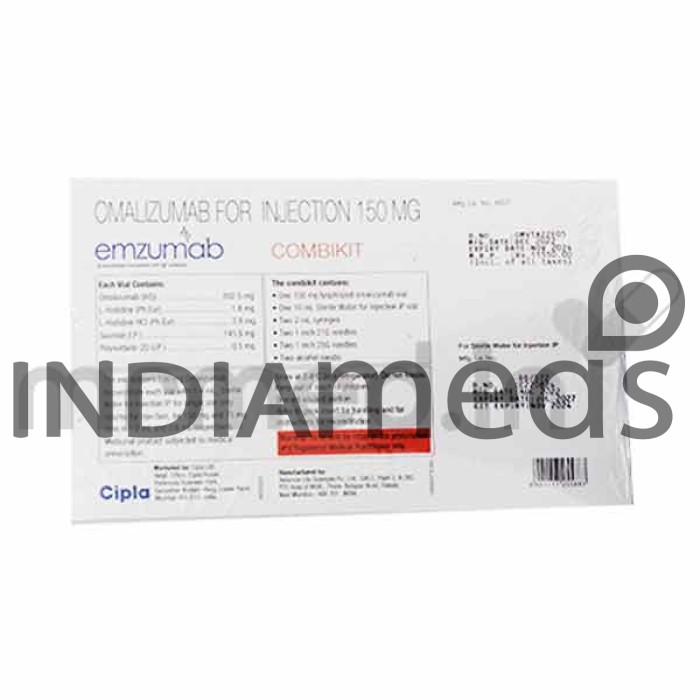Emzumab 150mg combikit injection contains an active component called Emzumab 150mg combikit injection. This medicine belongs to monoclonal antibodies. This medication is used to treat allergic asthma, chronic rhinosinusitis (inflammation of the nose and sinuses) with nasal polyps, and chronic spontaneous urticaria (CSU). Inform your doctor if you are allergic to Emzumab 150mg combikit injection or any of the ingredients that are allergic to latex because the needle cap of the syringe may contain latex. Before using Emzumab 150mg combikit injection, it's crucial to consult your doctor if you have kidney or liver problems or suffer from an autoimmune disease.
Discussing these factors with your doctor ensures safe and informed use of Emzumab 150mg combikit injection for your specific medical condition. The safety and efficacy of the drug in children has not been established. So, it is recommended that you ask your doctor. Consult your doctor if you are planning to get pregnant or think you may be pregnant while breastfeeding.
Therapeutic Effects of Emzumab 150mg Combikit Injection
Pregnancy
It is unknown whether Emzumab 150mg combikit injection is harmful to the unborn baby. Notify your healthcare professional if you are pregnant or planning to have a baby think you may be pregnant.
Breast Feeding
Emzumab 150mg combikit injection is not recommended for breastfeeding women; it may be excreted in breast milk. So, before starting the treatment, inform your doctor if you are breastfeeding. Consult your doctor for more information.
Lungs
Inform your physician about any underlying lung disorders or breathing difficulty before taking Emzumab 150mg combikit injection, as this medication should be used with caution in lung disease patients.
Liver
Inform your physician about any underlying liver disorders or breathing difficulty before taking Emzumab 150mg combikit injection, as this medication should be used with caution in liver disease patients.
Alcohol
It is unknown whether it is safe to consume alcohol under medication. So, it is recommended to consult your doctor before taking medicine.
Driving
Emzumab 150mg combikit injection may cause side effects like tiredness or drowsiness. It is recommended to avoid driving and using machines.
Common
- Fever (in children)
- Reactions at the injection site (pain, swelling, itching, and redness)
- Pain in stomach
- Headache (very common in children)
- Upper respiratory tract infection (inflammation of the pharynx and common cold)
- Feeling of pressure or pain in the cheeks and forehead (sinusitis, sinus headache)
- Joint pain (arthralgia)
- Feeling dizzy
It is recommended to consult your doctor before taking the medicine. The drug may be contraindicated for patients who have food or seasonal allergies.
Inform your doctor if you are allergic to Emzumab 150mg combikit injection or any of the ingredients that are allergic to latex because the needle cap of the syringe may contain latex.
It is recommended to be cautious before taking the medicine when you have an autoimmune disease. It is contraindicated for autoimmune disease. Hence, you need to consult your doctor.
No, it is not recommended to drive or handle machines. The drug may cause dizziness or sleepiness. Consult your doctor before going to drive.
Before using Emzumab 150mg combikit injection, it's crucial to consult your doctor if you have kidney or liver problems or suffer from an autoimmune disease. It will help your doctor to ensure the safe and informed use of Emzumab 150mg combikit injection for your specific medical condition.
Molecule name: omalizumab | Therapeutic class: Anti-allergic agent |
Pharmacological class: Monoclonal antibody | Indications: 1. Allergic asthma 2. Chronic rhinosinusitis (inflammation of the nose and sinuses) with nasal polyps 3. Chronic spontaneous urticaria (CSU) |






-200x200.jpg)
